[Dec 2007, Volume 4 Quarterly Issue] Pdf File size - The IIPM Think ...
[Dec 2007, Volume 4 Quarterly Issue] Pdf File size - The IIPM Think ...
[Dec 2007, Volume 4 Quarterly Issue] Pdf File size - The IIPM Think ...
Create successful ePaper yourself
Turn your PDF publications into a flip-book with our unique Google optimized e-Paper software.
REIMAGINING INDIA<br />
systematic underinvestment in science “is<br />
likely to be the result if the growth of science<br />
is left to competitive market forces”.<br />
He then refers to the “dilemma of ‘knowledge”,<br />
which he describes as that which,<br />
“pertains to the lack of compatibility between<br />
institutions which lead to the widest<br />
possible diffusion and utilization of<br />
knowledge and those which are particularly<br />
relevant for its creation in the very<br />
first instance”.<br />
If you need active, democratic, broader<br />
socially based, natural resource sustaining<br />
and future oriented policy, you<br />
need to create the intellectual environment<br />
for it. This then means better and<br />
more funding for research, in both the<br />
social sciences and natural sciences, especially<br />
in our universities. It is commendable<br />
that the 11th plan visualizes a<br />
massive investment in a whole new generation<br />
of advanced higher education<br />
institutions but existing universities do<br />
not adequately figure in the plan. <strong>The</strong><br />
Finance Minister allocating sums in his<br />
annual budget to Universities is also a<br />
good and welcome sign.<br />
<strong>The</strong> second theme that I would like to<br />
pick up and highlight from Sukhamoy<br />
Chakravarty’s prodigious output of his<br />
intellectual labour for economics and the<br />
country, is that relating to social learning,<br />
social innovation and questions regarding<br />
when do societies really become<br />
‘learning societies’. To a certain extent,<br />
in my view, it relates to the larger noninstitutional<br />
aspects of knowledge, unlike<br />
above where I partly referred to the<br />
institutional conditions for ‘knowledge’<br />
and ‘learning’. <strong>The</strong>re is also the other<br />
aspect of our ability to learn from other<br />
societies. In referring to the question of<br />
‘learning society’, we are dealing with<br />
broader questions of Human Resources<br />
Development and which are critical and<br />
particularly relevant where we stand today<br />
in our nation’s history. Knowledge in<br />
the perspective of Chakravarty needs to<br />
be seen as a public good. One could say,<br />
that in spite of all the middle class parlour<br />
talk and fashion for criticizing Nehruvian<br />
– Mahalanobis (N-M) strategy,<br />
it did give us a higher initial level of<br />
knowledge to start with. Chakravarty<br />
while objective and critical of the N-M<br />
strategy shows its validity and contribution<br />
also. On the second aspect, that of<br />
knowledge being widely shared, this is<br />
where we as a highly caste-ridden and<br />
hierarchical society, have had our problems<br />
and also by and large inherited so-<br />
<strong>The</strong>re is an extra-ordinarily rich harvest of ideas from<br />
Sukhamoy Chakravarty’s writings and how we can go<br />
beyond the dichotomies of market and state, to address<br />
urgent and needed tasks of creating ‘a learning society’<br />
cially serious failures also.<br />
Other than these broad based requirements<br />
and aspects related to creating a<br />
dynamic learning society, that can be<br />
self-sustaining and sustainable, in an<br />
economic, ecological and social sense,<br />
there are other related aspects. Some of<br />
this is related to problems such as technology,<br />
its adaptation, innovation, use<br />
and dissemination. Chakravarty is of the<br />
view that while TNCs do bring technology,<br />
we have to seriously consider whether<br />
it will in fact “lead to a significant<br />
accretion of technical knowledge appropriate<br />
to Indian conditions”. So the creation<br />
and promotion of the conditions for<br />
a learning society, is not just to import<br />
and imitate but also to adapt and contextualize.<br />
Chakravarty with reference to<br />
technology adaptation says how it is,<br />
“more appropriate to the factor endowments<br />
of developing countries deserve<br />
very close considerations”; then adds a<br />
very important qualifier, “it would be<br />
most inappropriate to leave questions of<br />
adaptation to technologists alone” and<br />
the overall macro-economic framework<br />
must be also made conducive to the process<br />
of adaptation. Finally, his other related<br />
and important point, that “given<br />
the contemporary trends in technology,<br />
it is important to allow for a theory of<br />
‘knowledge’ production and dissemination”.<br />
<strong>The</strong>re is an extra-ordinarily rich<br />
harvest of ideas and practical policy options<br />
from Sukhamoy Chakravarty’s writings<br />
and how we can go beyond the dichotomies<br />
of market and state, to address<br />
urgent and needed tasks of creating ‘a<br />
learning society’. Time and space does<br />
not allow us to go, into further discussion<br />
and elaboration in this area. In sum, one<br />
can only say that we need to see how to<br />
bring ‘knowledge’ and ‘learning’, as two<br />
very critical aspects of not just economic<br />
growth, but for economic, social and cultural<br />
progress in large and complex developing<br />
societies as ours. It would be a<br />
mockery and travesty to reduce such<br />
unique, rich and diverse societies as ours,<br />
to narrow and limited frameworks of<br />
‘state versus market’.<br />
Comparative Development And<br />
Governance<br />
<strong>The</strong> renowned, ecological and environ-<br />
20 THE <strong>IIPM</strong> THINK TANK


![[Dec 2007, Volume 4 Quarterly Issue] Pdf File size - The IIPM Think ...](https://img.yumpu.com/29766298/19/500x640/dec-2007-volume-4-quarterly-issue-pdf-file-size-the-iipm-think-.jpg)
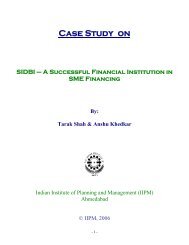
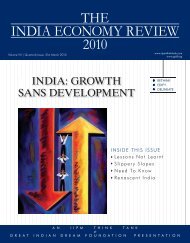
![[Feb 2008, Volume V Annual Issue] Pdf File size - The IIPM Think Tank](https://img.yumpu.com/43961117/1/190x245/feb-2008-volume-v-annual-issue-pdf-file-size-the-iipm-think-tank.jpg?quality=85)
![[June 2008, Volume V Quarterly Issue] Pdf File size - The IIPM Think ...](https://img.yumpu.com/41693247/1/190x245/june-2008-volume-v-quarterly-issue-pdf-file-size-the-iipm-think-.jpg?quality=85)
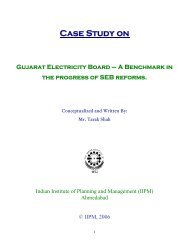
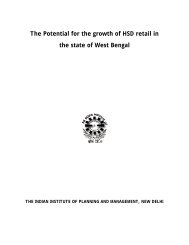
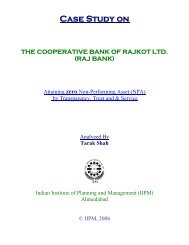
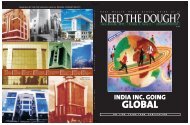
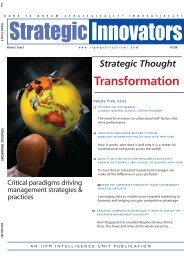
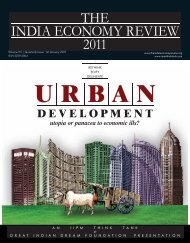
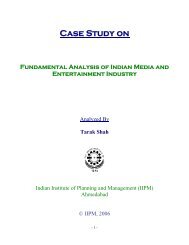
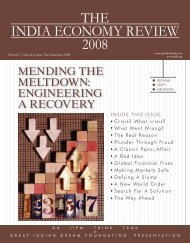
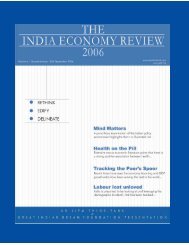
![[Volume VI | Quarterly Issue: 31st May 2009] Pdf File size](https://img.yumpu.com/27796051/1/190x245/volume-vi-quarterly-issue-31st-may-2009-pdf-file-size.jpg?quality=85)